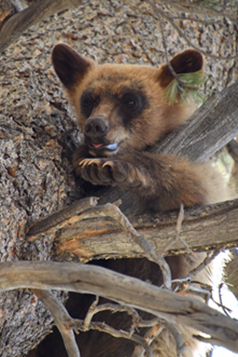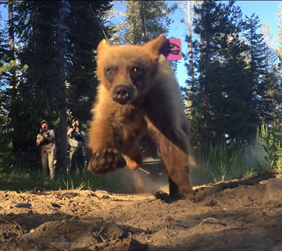Summer is upon us! The days are longer, the weather is warmer, and the kids are finally out of school and ready to explore their new-found freedom; and in a similar capacity, so are the young black bears of Yosemite. The transition from spring to summer is a coming-of-age time in the lives of young yearling black bears, when they are forced to leave their mothers’ sides and begin life on their own. These yearling bears set off on their own in May and June after spending a full year with their mother learning the way of the woods. However, they are still naïve and extremely curious, making this a crucial window for their behavioral development and the focus of many management efforts as they try to find their place in the world during these early summer months.
 In their first year of life, black bear cubs learn and grow under the watchful eye of their mother. They learn foraging habits and feed off of the sow’s extremely nutrient-dense and fatty milk, rapidly taking on weight. A year passes before the mother stops providing for her now 40-to-80-pound offspring, and instead chases it off. The sow will do this (often repeatedly) to send a message to her offspring that their free ride is up and it is time for them to be self-reliant. This is mainly triggered by the energy demands of the rapidly growing yearling, which outpaces the sow’s ability to provide for it, along with her own need to put on weight and a budding interest in reproducing again.
In their first year of life, black bear cubs learn and grow under the watchful eye of their mother. They learn foraging habits and feed off of the sow’s extremely nutrient-dense and fatty milk, rapidly taking on weight. A year passes before the mother stops providing for her now 40-to-80-pound offspring, and instead chases it off. The sow will do this (often repeatedly) to send a message to her offspring that their free ride is up and it is time for them to be self-reliant. This is mainly triggered by the energy demands of the rapidly growing yearling, which outpaces the sow’s ability to provide for it, along with her own need to put on weight and a budding interest in reproducing again.
These yearling bears are well prepared for life and capable of beginning on their own. However, they’ll need to establish their own home range and find their own food sources without the helpful guidance and added security they previously had with their mother. It takes a bit of time and a lot of and exploring from an already innately curious creature, which can get them into trouble if they find themselves in campgrounds or around other human populated areas.
The majority of bear reports in Yosemite in the last month have been from yearling bears in and around campgrounds. What seems like an innocent pass-through of these campgrounds (or any other human populated area for that matter) can be detrimental to their development if met with a human food reward or increased comfort around people. While these yearlings venture out for new territory and food sources, they are constantly learning and picking up habits (both good and bad) that will stick with them for life, making them extremely vulnerable to becoming habituated and food conditioned. If a bear gets human food in a campground, from a backpack, a cooler, or even overflowing trash, it creates a nearly irreversible learned behavior for that bear to associate these objects and areas as potential food sources. At that point, a bear might alter its normal foraging behavior and spend some of its time opportunistically searching for human food, beginning a downward spiral in behavior.
 Many of our management efforts are aimed at preventing these bears from ever getting to the point of becoming habituated and/or food conditioned due to human negligence, but it is not always enough. With the amount of visitation Yosemite receives, the margin for human error is small, so each year bears obtain human food and become habituated and/or food conditioned. At that point, our next response is a tireless effort of extensive monitoring and negative conditioning routine of these bears whenever they exhibit these behaviors, in hopes of returning these bears to their wild ways. Patrols can turn into all-night affairs in an attempt to remove human food from their diet. The quicker we can intervene the better, which is why it’s critical to report all bear sightings to the Yosemite Bear Hotline at 209/372-0322.
Many of our management efforts are aimed at preventing these bears from ever getting to the point of becoming habituated and/or food conditioned due to human negligence, but it is not always enough. With the amount of visitation Yosemite receives, the margin for human error is small, so each year bears obtain human food and become habituated and/or food conditioned. At that point, our next response is a tireless effort of extensive monitoring and negative conditioning routine of these bears whenever they exhibit these behaviors, in hopes of returning these bears to their wild ways. Patrols can turn into all-night affairs in an attempt to remove human food from their diet. The quicker we can intervene the better, which is why it’s critical to report all bear sightings to the Yosemite Bear Hotline at 209/372-0322.
It’s hard to express just how heartbreaking it is to see a wild Yosemite bear, especially so early on in its life, begin down a path to habituation and food conditioning. What was once a wild and self-reliant bear becomes a sad symbol of the mark we as man have on nature. However, through proper food storage, keeping our distance, educating people, and respecting wild animals can we lessen the impact we are having on Yosemite bears and continue to coexist with these charismatic creatures.
